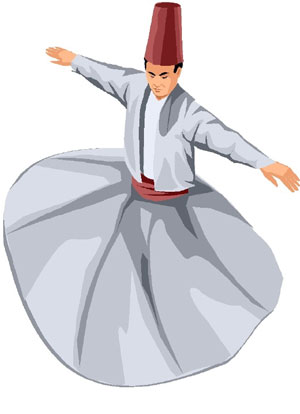|
Jalalludin Rumi I first encountered Rumi's poems in a Boulder, Colorado bookstore during the summer of 1974. The volume, Mystical Poems Of Rumi, translated by A.J. Arberry, had a dark, swirling mandala on the cover. Everything about the volume intrigued me. Buying the book and reading a few pages, I felt a vague presentiment of having known the poems before, though that would have been impossible. I'd heard of Rumi, though, for in his illustrations of the ways of the Spiritual Path, Meher Baba had used stories about Rumi's discipleship to his Master, Shams of Tabriz. The next spring I was walking with the book under my arm at a huge Rennaisance Fair in Cincinnati, Ohio. I came upon a thin, bare-chested young man who was beating a small drum and swaying in small, rhythmic movements. Everyone in the crowd passed him by, seeming not even to notice. Somehow, though, his every movement held me spellbound. I felt the book of Rumi poems suddenly come alive. I opened it and and began reading aloud from it as the fellow continued to dance and drum. Some passersby noticed. A few stopped to watch and listen, though the Victorian English in the Arberry translation was off-putting and probably made me sound to them like an Evangelist. Afterward, the dancer took the Rumi book in his hand. "Things usually happen when he's around," he said. He was a mime as well as a dancer, and his stage name was Bread. He lived on Maui, in Hawaii, where he was a member of a Sufi order. * * * * Not very many years later, Coleman Barks came out with his first "vernacular" version of Rumi, done with the help of his translator friend, John Moynes. A limited-edition book of glorious Rumi poems also came out in Santa Fe in the early '80s. By some time in the '90s, the West had recognized its thirst for Rumi's wisdom, to the extent that the 13th century Persian became the best-selling poet in America! According to Meher Baba, Rumi, like his compatriot Hafiz, was a Perfect Master and thus All-Knowing! We are thus the beneficiaries of his glorious odes to God's Love, the hundreds of Teaching Stories collected in the Masnavi, and the rich veins of Divine Wisdom that he mines sometimes with earthy humor and sometimes with stunning eloquence. Here (click the link)
are some of my favorite lines from Rumi.
They go as far as words can go, I think, in describing the Indescribable Some Rumi Websites http://www.khamush.com/
***** "What
Remains Is the Essence", the home pages of Max Reif
Please
introduce yourself:
|
